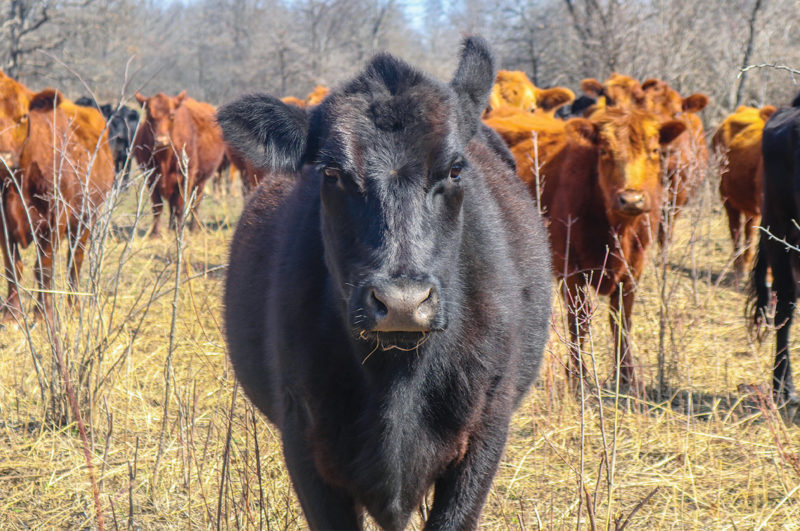My mental health is directly tied to my animals. If my cows are anxious, then I am anxious. If my cows are unsettled, then I am unsettled. If my cows are content, then I am content. I, of all people, should understand the role of an emotional support animal, but there are some things I just don’t get.
It was at a rodeo that I first noticed how extreme emotional support animals have become. I saw a barrel horse sharing a stall with a miniature pony. My curiosity forced me to ask what the purpose of the pony was.
“My horse gets anxious, and the mini pony helps calm him down,” the barrel racer replied.
“An emotional support pony,” I think to myself. “I really have seen it all.”
Imagine the discussion the barrel horse has with his buddies.
First barrel horse: “My owner thinks I’m ugly, that’s why I’m covered in glitter and fringe.”
Second barrel horse: “My owner thinks I’m slow, so I have to take that supplement that makes me fart, and she puts magic mud on my legs.”
Third barrel horse: “My owner thinks I’m a spaz, so I have to room with a mini.”
I truly understand the phenomenon. A trip to Walmart can be emotionally taxing. But how does my dog crapping in the linen aisle assuage that strain? Yet, I see emotional support animals everywhere.
I am a young man, but I’m old enough to remember when emotional support animals were just called “pets.” In today’s era, people have gone crazy with their animals. Whenever someone claims that their “fur baby” is a “member of the family” and the pet owner is the “parent,” I want to say, “Your ‘child’ is ugly and has a low IQ, and their breath smells like they use their tongue as toilet paper.” (I am the only one with these thoughts, aren’t I?)
At the same time, I have more pets than I have children. Whenever I think someone is pretentious about their pets, I will notice the pretensions I have about mine. For instance, my sister raises French bulldogs. They are ugly (I know; it takes one to know one) and are like a slot machine that never pays. I was at a cow cutting, and a mutual friend made fun of the money my sister spends on her French bulldogs. Without even thinking, I exclaimed, “You own cutting horses … and someone else spends too much money on their pets?!”
We laughed uncomfortably, but that is how the world works … everyone else’s pets are silly and wasteful, but my pets are completely reasonable. Emotional support cutting horses – is that a thing?
To clarify the difference between a service animal and an emotional support animal, I spoke with Tom and Jo Ferguson, who are the owners and trainers of Disability Dogs in Twin Falls, Idaho.
Tom says, “Service dogs are trained to perform a specific task for an individual with a seen or unseen disability, and emotional support animals are for new age sissies who don't want to leave the pet at home.”
After elbowing Tom in the ribs, Jo adds, “Service animals are defined as dogs that are individually trained to perform tasks for people with diagnosed disabilities. Service animals are protected under the Americans with Disabilities Act. Service dogs are trained and under [the] control of their handler. They perform specific tasks that aid their person to exist independently. Service dogs have full access to public life in order to do their job, just like a wheelchair or cane. An emotional support animal, just by their existence, provides comfort to an individual. It does not perform any task to assist their person in everyday life. There is no doubt that they help people feel better; however, they are not covered under the law.”
The key definition of a service animal is their specialized training. A well-trained animal does not a service animal make. The cutting horses I own have tens of thousands of hours of training. However, I would not use my cutting horses as a therapy horse at Rising Stars Therapeutic Riding Center. Their training is not relevant for that application. Similarly, if your well-trained dog doesn’t have specialized training, nor you a diagnosed disability, then your dog can’t access all the places service dogs have a legal right to enter.
I offer a truce to all animal owners. First, can we agree that your pet impersonating a service animal to enter public places is worse than parking in handicapped parking when you don’t need the space? With all of our animals at home, in a barn or at an animal park, can we all agree that our animals enhance our lives in immeasurable ways? Whether it is a working cow dog, a backyard chicken making breakfast or a miniature pony that eases your anxiety, animals enrich the human experience. Let’s accept how others tend to their property. I won’t mock indoor pets or the cat lady with a kitten in a baby stroller. Your pet should bring you happiness. Animal lovers from less rural areas should respect the ways we interact with our dogs, barn cats, horses and other livestock. Could we make that truce? And could we respect the work of service animals in public spaces?
Finally, I will leave my emotional support cows where they belong … far away from the linen aisle at Walmart.

.jpg?t=1687979285&width=640)





